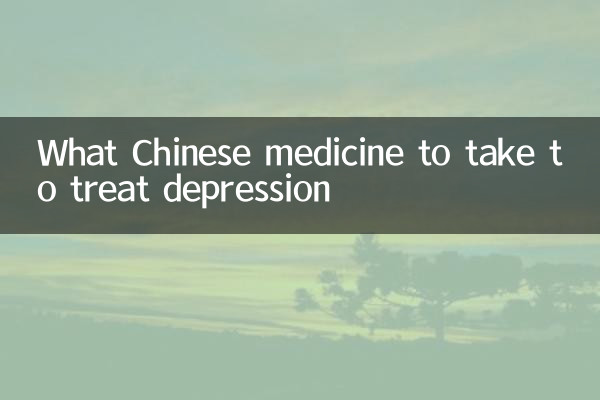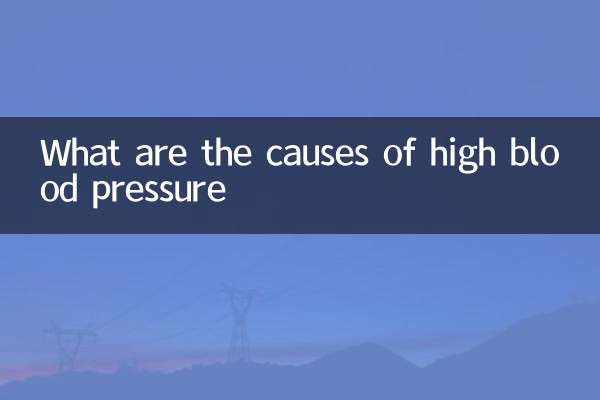What Chinese medicine to take to treat depression
Depression is a common mental illness that has received widespread attention in recent years. In addition to psychotherapy and Western medicine, Chinese medicine is also regarded by many as an auxiliary treatment modality. This article will combine the hot topics and hot content on the Internet in the past 10 days to introduce some traditional Chinese medicines commonly used to treat depression and their effects.
1. Traditional Chinese Medicine understanding of depression

Traditional Chinese medicine believes that depression is mostly related to factors such as stagnation of liver qi, insufficient qi and blood, and deficiency of the heart and spleen. Treatment focuses on soothing the liver and relieving stagnation, strengthening the spleen and nourishing the heart, and harmonizing qi and blood. Here are several traditional Chinese medicines commonly used to treat depression and their benefits.
| Chinese medicine name | Main functions | Applicable symptoms |
|---|---|---|
| Bupleurum | Soothe the liver, relieve stagnation, and reconcile qi and blood | Depressed mood, chest tightness and hypochondriac pain |
| White peony root | Nourish blood, soften liver, relieve pain and relieve pain | Irritability, insomnia and dreaminess |
| Poria | Strengthen the spleen, calm the heart, diuresis and dampness | Loss of appetite, palpitations and insomnia |
| Wild jujube kernel | Nourishes the mind and calms the nerves, relieves sweat and promotes fluid production | Insomnia, dreaminess, palpitations and uneasiness |
| Licorice | Tonify the spleen, replenish qi, and harmonize various medicines | Weak spleen and stomach, shortness of breath and fatigue |
2. Recommended popular Chinese medicine prescriptions
In addition to single traditional Chinese medicine, traditional Chinese medicine also commonly uses compound prescriptions to treat depression. Here are several common prescriptions and their components:
| Prescription name | Main components | effect |
|---|---|---|
| Xiaoyaosan | Bupleurum, white peony, angelica, atractylodes, poria, licorice, mint, ginger | Soothe the liver and relieve depression, strengthen the spleen and nourish the blood |
| Ganmai jujube soup | Licorice, wheat, jujube | Nourishing the mind and calming the mind, balancing the urgent |
| Guipi Tang | Astragalus, ginseng, atractylodes, angelica, longan, jujube kernel, polygala, costus, licorice | Strengthen the spleen and heart, replenish qi and blood |
3. Precautions for treating depression with traditional Chinese medicine
1.individual differences: Traditional Chinese medicine treatment needs to be based on syndrome differentiation and treatment based on individual constitution and symptoms, and medication cannot be used blindly.
2.Incompatibility: Some Chinese medicines and Western medicines may interact. Please consult your doctor before taking them.
3.Treatment question: Traditional Chinese medicine treatment of depression usually takes a long time, and patients need to be patient and persist.
4.lifestyle: Combined with good work, rest, diet and exercise habits, the effect will be better.
4. Hot topics related to depression in the past 10 days across the Internet
1.Celebrity Depression Incidents: A well-known artist openly talked about his experience with depression, sparking widespread discussion.
2.Research on the treatment of depression with traditional Chinese medicine: Latest research shows that certain traditional Chinese medicine ingredients have a significant effect on improving depression symptoms.
3.Prevention and treatment of depression in teenagers: The education department issued new regulations requiring the strengthening of students’ mental health education.
4.seasonal depression: As the seasons change, how to prevent and treat seasonal depression has become a hot topic.
5.Depression and diet: Nutritionists explore which foods can help improve symptoms of depression.
5. Conclusion
Traditional Chinese medicine has a long history and unique advantages in treating depression, but it must be used under the guidance of a professional physician. At the same time, the treatment of depression requires comprehensive psychological, drug, lifestyle and other aspects of intervention. I hope that the introduction in this article can help everyone better understand the application of traditional Chinese medicine in the treatment of depression.
Please note: This article is for reference only. Please follow your doctor’s advice for specific medication. If you have symptoms of depression, please seek professional help promptly.

check the details

check the details